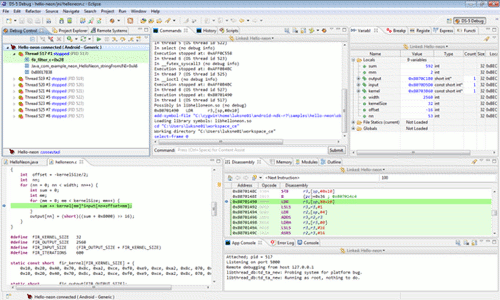ARM announced a free version of its Eclipse-based DS-5 tools for small development firms (with 10 or fewer developers) and individuals who publish applications for Android. The ARM Development Studio 5 (DS-5) Community Edition (CE) helps create performance- and power-optimized native software by integrating a graphical debugger for code generated for the Android Native Development Kit (NDK) and a basic version of the ARM Streamline performance analysis tool. DS-5 CE is designed to work with Android Virtual Devices ( AVDs), development boards and devices that run Android 2.2 and API 8 or higher. ARM Development Studio 5 (DS-5) Community Edition is distributed as plug-in for Eclipse and completes the app developer toolkit with a C, C++ and Assembly graphical debugger that builds on the Android Debug Bridge (ADB), a software performance profiler and system analyzer (ARM Streamline). To get started, you’ll need Eclipse IDE, the Android SDK and the Android NDK […]
Android NDK Revision 7 for Android 4.0 (ICS)
Google has just released Android Native Development Kit Revision 7, the Android SDK that allows developers to reuse C/C++ code. This version adds new native APIs available in Android 4.0. Here’s the changelog of the most important new features and bug fixes: NDK APIs for Android 4.0 (API level 14): Low-level streaming multimedia: A new API based on Khronos OpenMAX AL 1.0.1 provides a direct, efficient path for low-level streaming multimedia. The new path is ideal for applications that need to maintain complete control over media data before passing it to the platform for presentation. Audio decoding into PCM: Extensions to the existing native audio API based on Khronos OpenSL ES let native apps decode compressed audio assets to PCM format. CCache support to allow faster rebuilds. Added support for setting APP_ABI to all to indicate that you want to build your NDK modules for all the ABIs supported by […]
Embedded Android Workshop at Android Open 2011
The first Android Open Conference took place about 10 days ago. Karim Yaghmour of OperSys published the presentation slides he used during his Android presentations. See Embedded Android Workshop presentation slides below. Those 159 slides cover the following: Android Basics Android History Android Ecosystem Legal Framework for Android Platform and Hardware requirements Development Tools Concepts and Internals: Android Concepts Framework Intro Native Development Overall Architecture System startup Linux Kernel Hardware Support Native User-Space Dalvik JNI System Server Calling on Services Activity Manager Binder Stock AOSP Apps Android Open Source Projects Tools and location Content Building Build system Adding new applications Images Using adb System Server Services run by System Server Observing the System Server Calling on system services Inside a few system services Creating your own system service Hardware Abstraction Layer Android Framework Location and components Android Customization Custom Toolchains and Dev Kits Rationale SDK generation NDK generation Creating a […]
Android NDK revision 6b
Google has just released Android Native Development Kit Revision 6b, the Android SDK that allows developers to reuse C/C++ code. It is a bug fix version without new feature compared to Revision 6. Here’s the Changelog of the most important bug fixes: Fixed the build when APP_ABI=”armeabi x86″ is used for multi-architecture builds. Fixed the location of prebuilt STLport binaries in the NDK release package. A bug in the packaging script placed them in the wrong location. Fixed atexit() usage in shared libraries with the x86standalone toolchain. Fixed make-standalone-toolchain.sh –arch=x86. It used to fail to copy the proper GNU libstdc++ binaries to the right location. Fixed the standalone toolchain linker warnings about missing the definition and size for the __dso_handle symbol (ARM only). Fixed the inclusion order of $(SYSROOT)/usr/include for x86 builds. See the bug for more information. Fixed the definitions of ptrdiff_t and size_t in x86-specific systems when they […]




